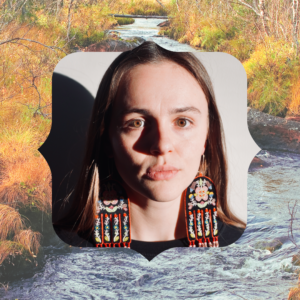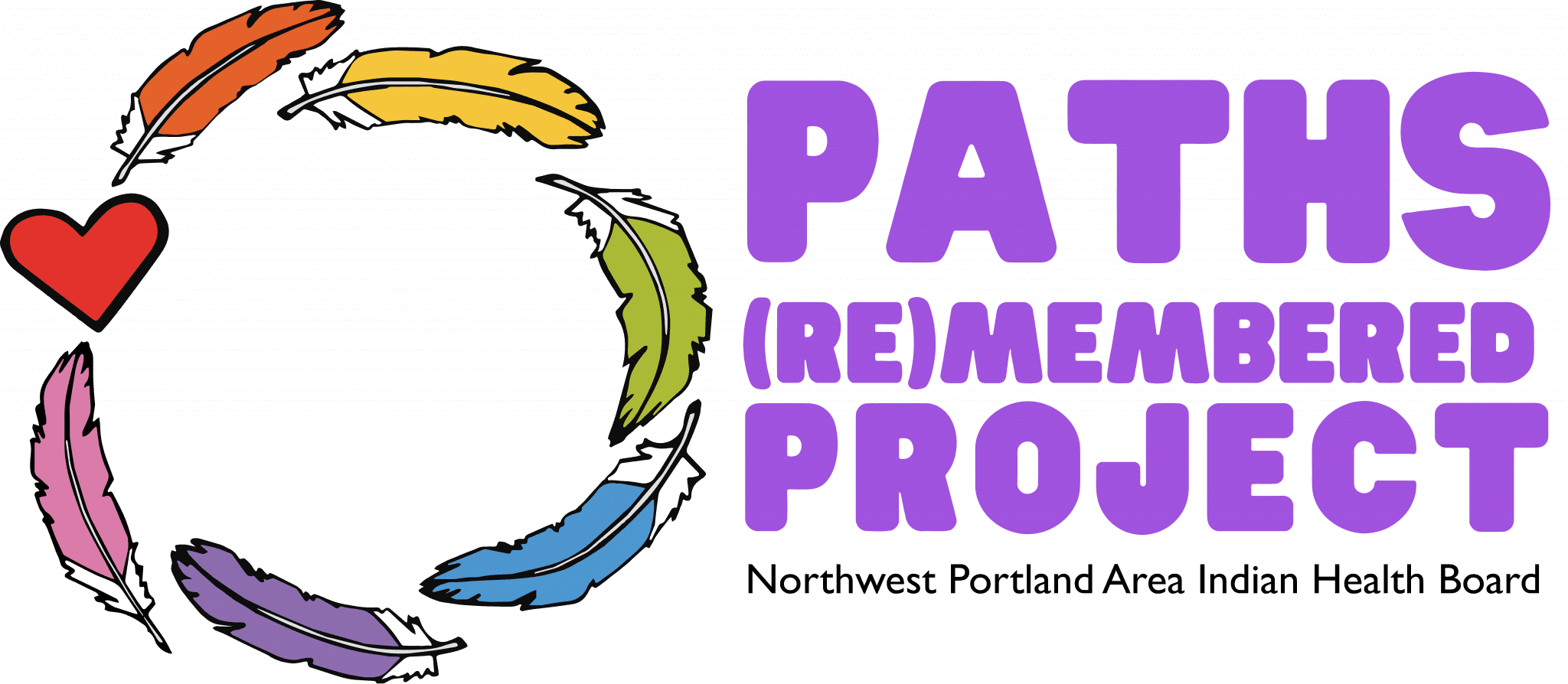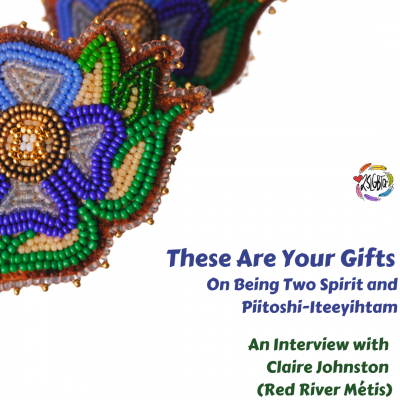These Are Your Gifts: On Being Two Spirit and Piitoshi-Iteeyihtam
An Interview with Claire Johnston
I’ve been looking forward to speaking with you since I listened to your interview on the Neurodivergent Woman podcast where you spoke so eloquently about the intersections of Two Spirit identity and neurodivergence. If I understood correctly from that podcast, you’ve collaborated with the Restorying Autism Collective, which challenges western, capitalist, biomedical, and colonial understandings of people who think differently. What does it mean to you to have an Indigenous understanding of neurodivergence?
I’m Red River Métis. We’re a post contact Indigenous people, so we have this really interesting and beautiful mesh of European and First Nations traditions. In our community, we revere difference. The other day I was with an elder at a sharing circle with other neurodivergent folk and he was speaking about how boring and nonfunctional our world would be if we did not have difference, if everyone had the same life. That’s what colonial capitalism produces. Everyone works nine to five, everyone has an iPhone, everybody dresses in the same way and speaks the same way and has the same interests. I tend to view both my neurotype and my gender and sexuality as simply a different way of existing in the world, a way of existing that doesn’t fit nicely into the nuclear family or into capitalism or into colonial ways of being. I don’t align with the understanding of autism as a superpower. That’s off-putting to me. I just think that everyone has gifts, no matter who you are. And everybody should have the opportunity to realize those gifts, including autistic people, including neurodivergent people who have really particular gifts that only we can bring to the world. If we’re not bringing those gifts that is a negative thing for everyone.
I love that already you’re talking about gender identity and sexuality. How is your Two Spirit identity in relation with neurodivergence?
The ways I see them interact are massive. I’ve noticed that since my autism diagnosis, as I’ve tried to unmask and be more of who I am, I’ve discovered more about my gender and sexuality. I’ve always had both energies—I don’t like saying masculine and feminine, because there are so many ways the energies can manifest. I’ve always felt really physically strong. I tend to be quite analytical, which is often associated with masculinity. I have three siblings—one brother and two sisters—and I’ve always been the one trailing along behind my dad trying to learn how to use his tools. I love the color pink, but I don’t like wearing hyperfeminine clothing. As part of my effort to unmask, I actually decided to donate a bunch of my clothes, because I realized that part of my unmasking is refusing to perform a gender expression that isn’t actually mine. So many things—my clothing, even the way I carry my body—come from having been socialized as a woman, but also socialized not to look or act autistic. So as I look to unmask, to be more myself, that impacts my gender and sexuality.
I’ve also really narrowed my friendship group. I’ve surrounded myself with people who are neurodivergent, mostly people with my neurotype—AuDHD, autistic and with ADHD. Almost every single one of those people are queer, which is funny because I never used to feel comfortable in queer spaces like bars or parties. I understand the history of those places providing safe spaces, but those aren’t comfortable spaces for me. I prefer socializing one on one, having really deep conversations with people who share my interests. I’m now part of the Medicine Wolf Healing Lodge, a Two Spirit lodge here in Manitoba. We’re having our first ever Two Spirit Sundance on Turtle Island (the first that we know of) next month in August. When I go to the Two Spirit Lodge everyone gets me. They communicate in a way that’s comfortable for me.
We have a Métis word, Piitoshi-Iteeyihtam, for someone who thinks differently. I like to use that word instead of the word autism to describe myself. In terms of what the overlap between gender and neurodivergence means, I’m still trying to find that out. Those teachings need to be restored and prayed about. As a result of colonization, being Two Spirit or queer has been a mental disorder for much of our history. Being autistic is still considered a disorder. But I think one day that will change. I won’t have to adapt, the world will adapt, will be more accommodating of people who think like me.
When you think about that world, about a liberated future for Two Spirit neurodivergent people, what does that future look like?
When I think about what a liberated future looks like, in the context of being Two Spirit and autistic, I think about the ways a lot of our communities existed in my ancestors’ time. I’m a Métis beadwork artist. In my ancestors’ time, when they were still beading, before it was outlawed, I would have been watched as a young person, my gifts would have been identified by members of the community, and I would have been given roles, I would have understood my responsibilities. Others would acknowledge my gifts and my responsibilities, and vice versa. I would have a really strong understanding of who I was, and I would have a strong understanding of my path, my role within the community.
There’s a Cree law Wahkohtowin that I carry with me—it’s like the interconnectedness of everything, it’s how to live in a good way where everyone has a role and something to bring to the world. We’ve been so separated from that, from that intergenerational gift, in which the old people watch and recognize the gifts in the young people and tell them who they are. I’m 26, and I’m only, finally, starting to understand my roles and responsibilities and gifts. And that understanding is a result of having really intentional relationships with older people in my life and spending tons of time with children. I do my own beadwork practice, and I teach workshops. At schools or community organizations, whenever I’m with youth, I’m watching them, and I tell them, Do you know you’re gifted at this? Just so you know, you’re gifted at this, and people who have this gift often do these things.
I wish the world could be the way I’m trying to be in my art practice and my relationships. I wish that instead of saying, We’ve assessed you and found out what’s wrong with you, the world would take a strengths-based approach and say, We’ve watched you since you were a baby and these are your gifts.
A liberated future to me looks like our communities being really strong, our nations being really strong. It’s a future where we’re putting the sacredness of children and elders at the forefront, because when you do that, it’s good for Two Spirit and neurodivergent people, but also it’s good for everyone.
How can neurotypical Two Spirit and Indigiqueer folks be more inclusive of their neurodivergent relatives?
What comes to mind first for me is just to not make assumptions about our behavior. I’m often not able to be friends with neurotypicals because of the assumptions people made about my behavior, because of how fully I’m misunderstood. I’ve internalized really awful ideas about who I am because of how others have said that I am. Even jokes and teasing, small comments, when you hear them over and over they can have a really major effect.
I was thinking recently about how many autistic people died in the residential schools, all these people with intense spiritual gifts that were stolen via genocide. A few years ago there was this news piece about a First Nations boy who died in a residential school, and his name on the school register was Dummy Bad Boy. That was almost certainly a non-speaking autistic boy. So when I hear people use the word, dumb, I’m think, you are talking about people like me. These words are normalized in our society, but they are also really pointed towards certain groups. A lot of our Two Spirit people didn’t make it through residential school and a lot of our Piitoshi-Iteeyihtam didn’t make it. These are two groups that have such gifts to bring, but have been disproportionately impacted by colonization. It’s one of the reasons it means so much to me to spend time with young people today.
What message would you want to send to the young Two Spirit people with Autism and/or ADHD who might read this?
Go deep into your difference. Explore. Find other people who also have that difference. Find out how to share that important difference with others. Because there is probably another little person behind you, who needs to hear what you have to say. I should say that I’m speaking from the perspective of being a white-coded Indigenous person. I know that unmasking and going deep into our differences isn’t always possible for safety reasons, especially if you’re trans or racialized.
Second, I’d say learn about yourself and advocate for yourself. Autism is one of my special interests. I love learning about it and about myself. Learning about my neurology and who I am as a Two Spirit person matters, because it equips me to advocate for myself. Knowing who you are and being able to confidently advocate for your needs can massively improve your quality of life.
The last thing I’d say is seek out meaningful relationships. With other neurodivergent people. With animals, with the land. Quantity doesn’t matter. If you have one very meaningful relationship, that’s awesome. So many of us live with mental illness. We have such high rates of suicide in the Two Spirit and neurodivergent worlds. We can’t utilize our gifts when we’re unwell, when we’re disconnected from our relationship with the land and disconnected from our relationships with ourselves. Know that you deserve to exist and to feel well, just like everyone else.
Anything else you’d like our readers to know?
I just found out a couple of weeks ago that I’m getting a grant with my dad to create a beaded wall pocket and a piece of woodwork to celebrate our family. My dad is Métis, and in my dad’s family the whole family line is super autistic. This piece will celebrate our line of Métis, Piitoshi-Iteeyihtam people. The whole thing will be a really beautiful opportunity for knowledge transfer between my dad and me as we work on together. There will be three pockets—one for me, one my dad, and one for my grandpa. I’m going to put my diagnostic report in mine. I have letters from people thanking my grandpa for making them things to put in his. I’ll put in items that speak to our experience of being people who think differently.
Once I’m an ancestor, I hope they’ll look at the wall pocket and they’ll be like, Oh, Grandmother Claire was Piitoshi-Iteeyihtam. And so was Grandfather Roy. And this beadwork says who we are. It tells a story about our family. I’m also hoping we’ll be able to have it on exhibit, to serve an educational purpose about our family story and also our Métis story, because we understood and acknowledged neurodivergence in our nation way before the word neurodivergence was even coined. The whole piece will be a celebration of who we are.
And last, my friend and I have been organizing a neurodivergent intergenerational circle of support, a space where we can gather and build relationships across generations. The circle is Indigenous-led, but it’s open to anyone. We just had our first meetup last month, and we’re going to be meeting about once a month. Join us!

The beadwork depicted in the feature graphic are originals designed by Claire. The photo directly above this caption is Claire, wearing their own beadwork.


